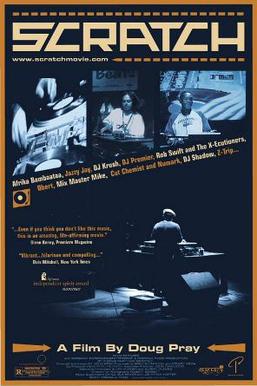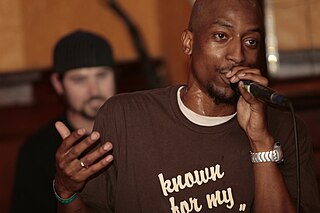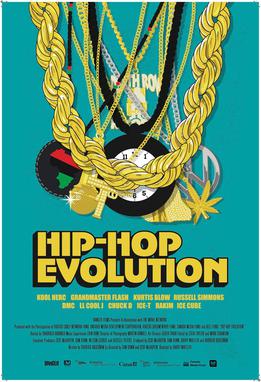Related Research Articles

Fred Brathwaite, more popularly known as Fab 5 Freddy, is an American visual artist, filmmaker, and hip hop pioneer. He is considered one of the architects of the street art movement. Freddy emerged in New York's downtown underground creative scene in the late 1970s as a graffiti artist. He was the bridge between the burgeoning uptown rap scene and the downtown No Wave art scene. He gained wider recognition in 1981 when Debbie Harry rapped on the Blondie song "Rapture" that "Fab 5 Freddy told me everybody's fly." In the late 1980s, Freddy became the first host of the groundbreaking hip-hop music video show Yo! MTV Raps.
Miami bass is a subgenre of hip hop music that became popular in the 1980s and 1990s. The use of drums from the Roland TR-808, sustained kick drum, heavy bass, raised dance tempos, and frequently sexually explicit lyrical content differentiate it from other hip hop subgenres. Music author Richie Unterberger has characterized Miami bass as using rhythms with a "stop-start flavor" and "hissy" cymbals with lyrics that "reflected the language of the streets, particularly Miami's historically black neighborhoods such as Liberty City, Goulds, and Overtown".

The Canadian Museum of History is a national museum on anthropology, Canadian history, cultural studies, and ethnology in Gatineau, Quebec, Canada. The purpose of the museum is to promote the heritage of Canada, as well as support related research. The museum is based in a 75,000-square-metre-building (810,000 sq ft) designed by Douglas Cardinal.
Pinoy hip hop or Filipino hip-hop is a style of hip hop music performed by musicians of Filipino descent, especially Filipino-Americans.

The Cold Crush Brothers are an American hip hop group that formed in 1978 in the Bronx, New York City. They were especially known for their memorable routines which included harmonies, melodies and stage-stomping performances. The Cold Crush Brothers still perform in the United States as of 2023. "A snapshot from hip-hop's 50th summer: A live mixtape"..

Scratch is a 2001 documentary film, directed and edited by Doug Pray. The film explores the world of the hip-hop DJ from the birth of hip-hop when pioneering DJs began extending breaks on records, to the invention of scratching and beat juggling, to the more recent explosion of turntablism. Throughout the documentary, many artists explain how they were introduced to hip-hop while providing stories of their personal experiences.
Native American Hip Hop is hip hop culture practiced by people of Native American heritage, including Canadian First Nation hip hop artists. It is not a specific form of hip hop but varies in style along the lines of hip hop in general. Native Americans have been present in hip hop culture since its inception as breakdancers, DJs, rappers, and graffiti artists. The Native American contribution to hip hop can occasionally be veiled by the ethnic umbrella term of Hispanic or Latino, terms that may refer to Native Americans in certain contexts.

The Canadian hip hop scene was established in the 1980s. Through a variety of factors, it developed much slower than Canada's popular rock music scene, and apart from a short-lived burst of mainstream popularity from 1989 to 1991, it remained largely an underground phenomenon until the early 2000s.
Ghetto Concept is a Canadian hip-hop duo from Toronto, Ontario, composed of Kwajo Cinqo and Dolo. Infinite, who is currently a solo artist, is a former member of the group.

Annie Pootoogook was a Canadian Inuk artist known for her pen and coloured pencil drawings. In her art, Pootoogook often portrayed the experiences of those in her community of Kinngait, in northern Canada, and memories and events from her own life.

Clive Campbell, better known by his stage name DJ Kool Herc, is a Jamaican American DJ who is credited with being one of the founders of hip hop music in the Bronx, New York City, in 1973. Nicknamed the Father of Hip-Hop, Campbell began playing hard funk records of the sort typified by James Brown. Campbell began to isolate the instrumental portion of the record which emphasized the drum beat—the "break"—and switch from one break to another. Using the same two-turntable set-up of disco DJs, he used two copies of the same record to elongate the break. This breakbeat DJing, using funky drum solos, formed the basis of hip hop music. Campbell's announcements and exhortations to dancers helped lead to the syncopated, rhythmically spoken accompaniment now known as rapping.

Leslie Seaforth, better known by his stage name More Or Les, is a Canadian rapper, DJ and producer. He is a member of the Canadian hip hop crew Backburner. He currently resides in his hometown of Toronto, Ontario.
Rock Steady Crew is an American breaking and hip hop group which has become a franchise for multiple groups in other locations. The group's 1983 international hit song "(Hey You) The Rock Steady Crew" peaked at No. 6 on the UK Singles Chart, and reached the top 10 in many European countries. Members of Rock Steady Crew featured in the films Flashdance and Beat Street, which ignited international interest in the b-boy subculture.
Battle rap is a type of rapping performed between two or more performers that incorporates boasts, insults, wordplay and disses originating in the African-American community. Battle rap is often performed spontaneously, or freestyled, in live battles known as rap battles, where participants will compete on the same stage to see who has the better verses.

King of The Dot Entertainment, also known as KOTD, is a Canadian rap battle league founded in Toronto, Ontario, Canada in 2008. The company's HQ is based in Toronto, from which it gets its name. Successful battlers such as Pat Stay, Dizaster, Head Ice, Rone, Arsonal, Charron, Math Hoffa, Madchild, and many more have battled in King of the Dot.

Hip-Hop Evolution is a Canadian music documentary television series that originally aired on HBO Canada in 2016. Hosted by Juno Award-winning artist Shad, the series profiles the history of hip-hop music through interviews with many of the genre's leading cultural figures. The series is produced by Darby Wheeler, Rodrigo Bascuñán, Russell Peters, Scot McFadyen, Sam Dunn and Nelson George. It won the 2016 Peabody Award, and the 2017 International Emmy Award for Best Arts Programming.
Ron Nelson is a Toronto-based DJ, broadcaster, music promoter, producer, educator, and performer best known for his role in popularizing both hip hop music and later dancehall and reggae music in Canada. He helped promote and develop early Canadian hip hop acts such as Maestro Fresh Wes, Michie Mee, Rumble & Strong and the Dream Warriors.
Mark V. Campbell is a Canadian academic, disc jockey and writer. He was raised in Scarborough, a suburb of Toronto, Canada. Currently, he is an assistant professor and Associate Chair of the Department of Arts, Culture and Media, University of Toronto Scarborough. Campbell's work focuses on new modalities of being human, sonic innovations within Black music, and the knowledge production of digital archives.

The Get Loose Crew is a hip-hop group that became the first Canadian rap group to independently finance, produce and secure distribution of an authentic Hip Hop mini-LP to sell outside Canada claimed by the Hart House at the University of Toronto. The group did not release a follow-up project and disbanded in 1990. One of the group members, Carl Badwa, MC B became the first Canadian emcee to win a Juno Award in 1990 for the category R&B/Soul Recording of the Year.
References
- ↑ Patty Winsa (March 12, 2017). "Before Drake, there was Maestro, Michie Mee and mix tapes: Toronto's hip-hop archive takes shape". Toronto Star . Retrieved November 30, 2021.
- ↑ Carrie Duncan (February 20, 2018). "Challenging the cultural narrative of hip hop in Canada". Ryerson University. Retrieved November 30, 2021.
- ↑ Matthew McAndrew (March 6, 2010). "Documenting the Toronto scene with T-Dot Pioneers and Northside Hip Hop". BlogTO. Retrieved November 30, 2021.
- ↑ Talia Ricci (March 1, 2019). "New exhibit shares how the city's hip-hop scene evolved through the decades". CBC News Toronto. Retrieved November 17, 2021.
- ↑ Luke Fox (May 16, 2018). "Twelve cool photos of Toronto hip hop culture in the pre-Drake era". Toronto Life . Retrieved November 30, 2021.
- ↑ Chris Hampton (March 15, 2018). "McMichael gallery showcases archive of Canadian hip-hop culture". The Globe and Mail . Retrieved November 30, 2021.
- ↑ "Mark Campbell explores the history of Toronto's hip-hop culture in new photo exhibition". Q , May 25, 2018.
- ↑ "CBC Radio celebrates hip hop". Telegraph-Journal , March 1, 2011.
- ↑ Calum Slingerland (March 2, 2017). "Canada's Hip-Hop Pioneers Honoured with Cross-Country "I Was There!" Project". Exclaim! . Retrieved November 30, 2021.
- ↑ Jordan Darville (April 18, 2017). "How Canada's Hip-Hop History Can Guide Its Cultural Future". The FADER . Retrieved November 30, 2021.